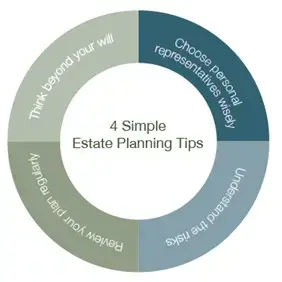Many people believe they’re not “rich enough” to have an estate plan, but estate planning isn’t just about how much money you have. So, what is estate planning about?
At a high level, it’s about making things easier for your heirs. Generally, it involves activities such as:
- Drafting a will
- Putting a power of attorney in place for your finances and your health care
- Designating beneficiaries for your investment accounts and insurance policies
- Appointing executors, trustees, and guardians for your dependent children
The real focus of an estate plan is to help you distribute your assets in precisely the manner you wish so you can reduce potential taxes and probate fees. It’s also about planning for your potential incapacity so you can reduce the burden on your beneficiaries.
Here are four tips for estate planning to help you get started.

1. Don’t Assume a Will is All You Need to Make Your Wishes Known.
Although a will is a critical part of an estate plan, in many cases it’s not the most important piece. You may also have durable powers of attorney to help manage your finances and/or health care if you are unable to do so, medical directives to clarify your wishes, life insurance policies, and trusts.
Additionally, many retirement savings accounts, such as 401(k) plans and individual retirement accounts (IRAs), have beneficiary designations assigned to them, and these supersede what’s in your will. That’s why part of an estate plan is to confirm that your beneficiary designations are up to date and in alignment with what’s in your will to avoid any confusion.
2. Choose Personal Representatives—and do so Wisely.
When you die without having named a personal representative (also called an executor in some states), a court-appointed person will typically be put in charge of distributing your assets. This could be a good thing or a bad thing, but why leave it to chance? Having an estate plan allows you to choose the person who will administer your estate in accordance with your wishes.
Similarly, if you have dependent children, you will also want to appoint a guardian you trust. If you don’t, a family court could decide who gets custody, depending on your personal situation.
Once you choose your personal representative and/or guardian, discuss your decision with them to make sure they’re up for the task. Not everyone will be comfortable assuming this role upon your passing, so it’s important to communicate in advance.
3. Understand the Consequences of NOT Having an Estate Plan.
If you die without a will or estate plan, your estate will be turned over to the state probate process. This can be time-consuming and very expensive—the taxes and fees involved can absorb a large portion of the assets you had intended to leave to your heirs. In fact, they may have to sell off additional portions of your estate just to pay for those taxes and fees.
Aside from the costly probate process, dying without a will or estate plan also means your assets may be left to someone not of your choosing, creating confusion and potential friction among your beneficiaries during an already trying time.
Because an estate plan is about more than your will, not having an estate plan may also put your dependent children at risk. In the same vein, without a power of attorney or medical directives in place, your family or other caregivers may struggle to look after you in the event of your incapacity. By clarifying all your wishes, you can prevent these challenges.
4. Review Your Estate Plan on a Regular Basis.
While you likely don’t need to review the entirety of your plan every year, it’s important to check in every three to five years to make sure your estate plan remains current. That’s especially true if your financial situation changes or if new laws are enacted that may affect taxes owing on death or charitable giving. It’s also a good practice to update your plan if you experience a major life event, such as a birth, death, marriage, divorce, etc.
The Bottom Line
While these basic tips are a good starting point for your estate plan, they are by no means comprehensive. That’s why most experts recommend working with tax professionals, estate planning attorneys, and financial advisors.
Beyond helping you draft the legal documents you need; these specialists can work with you to itemize your assets and liabilities, review your retirement accounts and insurance policies, reduce estate and income taxes, and address any fees that may be associated with passing down an estate. They may even be able to help you avoid common mistakes by providing you with an estate planning checklist that helps you think through the steps necessary for protecting your legacy.
If you’d like to put an estate plan in place or explore ways to strengthen your existing plan, speak to a Wealth Enhancement advisor today.
Advisory services offered through Wealth Enhancement Advisory Services, LLC, a registered investment advisor and affiliate of Wealth Enhancement Group®. Wealth Enhancement Group is a registered trademark of Wealth Enhancement Group, LLC.




